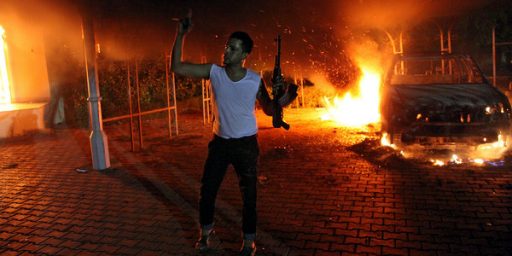The State of the Enemy II
TigerHawk has some extensive comments on my TCS article on the state of al Qaeda.
I agree with most of his addenda with some minor quibbles. He notes that, “it is not correct to describe our relationships with the “apostate regimes” [Saudi Arabia, Kuwait, Egypt, Jordan] as having ‘drawn closer.’They are, in the main, very unhappy with the American democratization strategy, which is integral to the wider war.” I meant “closer” in the context of our war with Islamist terrorists. All those regimes have been forced to choose sides against the terrorists and to quit playing both ends against the middle. They are, understandably, not happy about it. I can live with that.
He also contends that I am “a bit too positive” in attributing most of the rise in the price of oil to factors external to the Middle East. I don’t disagree that terrorists have driven up prices “at the margin.” The sabotage of Iraqi facilities by guerrillas has had a marginal impact on world oil prices, for example, and surely the Iraq War and various uncertainties caused by it has had some impact. Still, as TigerHawk notes, efforts by the oil states to tighten the supply have largely been unsuccessful. Hurricane Katrina did more to oil prices than OPEC and al Qaeda combined.






Very good summary on the state of al Qaeda and the war on terror..
My question is what would be different if the US had stopped with Afghanistan and not invaded Iraq. At first glance it appears that just about everything you cite in the decline in AQ is due to Afghanistan and that Iraq has not had a significant additional impact.
spencer: Well, al Qaeda is in the midst of a virtual civil war with other Muslim extremists as a consequence of Iraq. And hundreds of al Qaeda terrorists, including scores of their leaders, have been killed in Iraq.
As damaging as the Iraq War has been to the U.S. military, in terms of sheer strain, it has to be much more so on al Qaeda. It may well have been, as Michael Scheuer believes, the war they wanted. I’m not sure they still feel that way.
Foreigners have never been more then a few percentage points of the insurrection in Iraq.
There is a considerable body of evidence provided by the US military and intelligence community that Iraq has been a major source of recruiting for AQ. So I doubt the ongoing conflict bewteen some foreign fighters and domestic fighters has a significant impact on AQ.
Even the Sect. of Defense asked if we are creating more terrorists then we are killing —
implying he does not have a good answer.
You notice that it was not even discussed as an issue in the original article.
Your optimism on this is more wishful thinking then the objective analysis that was in the original article.